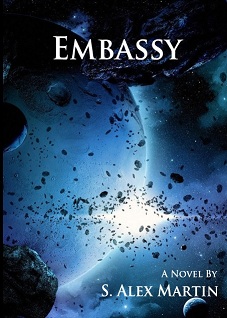Hey Writers, today we are interviewing S. Alex Martin, who was added on as an admin with YAWA!
Hey Alex, thanks for doing this interview with us! Can you tell us a little about yourself first?
I am 20 years old and I started writing full-length novels in June 2004, right after 6th grade (literally like two days after school got out). I am an Eagle Scout, I love astronomy, nature, tennis, dogs (specifically German Shepherds and English Bulldogs), and the beautiful city of Pittsburgh. I have three self-published novels and two short stories. The second short story became the inspiration for my current novel, Embassy.
Why did you start writing? Did you always want to be a writer?
Christopher Paolini, who wrote Eragon, is the sole reason I picked up a pen and started writing all those years ago. I’ve been writing for close to half of my life. There were times when I took extensive breaks (specifically, June 2004-December 2005; August 2007-May 2008; February 2010-February 2012; April 2012-January 2013). Yes, I keep a record of everything.
There were times where I didn’t see myself being a writer. I also thought it’d be nice to write for a living, but after three novels and no success (and being young, so believing no publishing contract after three novels meant failure) I sorta got in the mindset of wanting to be a high school physics teacher. But January 2013 rolled around, I started writing Embassy, and now I’m determined– with every fiber of my being–to make writing novels my career. I realistically believe that Embassy is going to be my debut novel in the traditional market.
How much research do you usually put into your books?
Umm, it depends. For my first three: next to nothing. For one of my short stories I sorta researched some historical facts as well as space tech. For the other short story (which would later inspire Embassy) I just wrote.
For Embassy itself, I can say that I put some research into it. Things like star names and distances from Earth and relative locations in the galaxy…I’ve kinda mapped-out exactly where Embassy takes place in the Milky Way, because it’s completely possible to do if you take the time.
Also, I had to study the fundamentals of languages, because there is a small bit of foreign language that I had to create from scratch. I have pages and pages of notes about verbs and nouns and conjunctions and participles and negative/positive statements and numbers written out to one thousand. It’s a lot of work just for those two lines of dialogue. But hey, now I speak a language nobody else knows, unless, of course, you are that person who knows what nian am means (yes, I’m looking at you).
What is your writing process? Do you write regularly at certain times or just when inspiration hits?
Go pay a visit to the most disciplined person you know.
Now amplify their discipline by 1000x. That is me. I have chugged through Embassy because I write the moment that time opens up. On a good day, I can write for about 9 hours straight (which I did for 10 days in a row to write Embassy). I write when I wake up. During the middle of the day. At bedtime. Whenever. If I’m not writing, I’m either in class, hanging with friends, or something is severely wrong.
Also, I’m a pantser, which allows me to write on the fly. I just throw stuff on the page. Now that I’ve worked out the plot and really got the story moving, quality and consistency are my top priorities. For anyone who has critiqued or read Embassy, you’ll know that it is pretty solid. I’m in the middle of the fourth draft. I didn’t plot the first or second drafts…but now I have something that works, and beautifully so.
What keeps you motivated?
I don’t let my motivation go away. When I need to get on track, I write and stay as undistracted as possible. I take notes, think, think, think, observe the world, and write. The secret is to keep writing and thinking and observing. Except for when you hit burnout. Then you should take a break. But I write every single day. In Embassy alone, I have written nearly every day since January 5, 2013, and logged 1,673 hours of writing/editing. To put that into perspective, that is nearly equivalent to how much sleep the average person has gotten in that exact same timeframe.
Lesson: I don’t let motivation go away. I lasso it in and tie it to a stake.
What inspired your book? How did it all start?
My first three books were just my imagination running wild. Looking back…it was scary. Somehow I got newspaper interviews and book signings. *shudders at visions of past*
Embassy, on the other hand, could be called the “drainage” of a short story I wrote. That story had two main characters, Arman Lance and Michael Rafting, who were on an assassination mission after being stranded on a planet for seven years.
Long story short (or is it the other way around? Hmmmm…) Embassy is like, the distant cousin to the great aunt whose sister is actually metaphorical for best friend and twice removed from the family tree three generations ago. My point? Embassy is NOTHING like the short story except for four things: General Orcher, Arman Lance, Michael Rafting, and the word “Embassy.” I took the novel in a COMPLETELY different direction than the short story. If you read the short story, you’ll know what I mean. And yes, it is available to readers. Just ask.
If you could only share one piece of advice with aspiring authors, what would it be?
“Walk, talk, breathe, laugh, cry, fall, rise, fail, succeed, run, jump, love, hate, hide, seek, learn, work, play, feel, LIVE.
Then write it down.”
What is your book about? Target age range?
Embassy is about a boy who just wants to be happy. And he doesn’t want to die alone. And he pretty much hates life. And he is trying to forget the bad things that have happened to him. And he obsesses over one girl he hasn’t seen in four years.
Okay, seriously, Embassy follows Arman Lance and his journey to salvage a better life than the one he’s lived. As he travels across the galaxy to find the girl he loves, Arman learns that you should not set your happiness in one person, but find happiness in life and love yourself. He struggles to do this.
It’s a journey, from Arman’s change to the trip across the galaxy. There is love, friendship, struggles, tragedy, adventure, comedy, beautiful vistas, outer space, technology, and a sweet sport called Hologis which some readers have told me is as exciting as Quidditch.
Target age range: Teens and Young Adults. It’s a story both boys and girls can enjoy, too.
What is your goal in writing and publishing this book?
I want to have the fourth draft “completely” done by August 20, 2013. After some minor revisions, I will then begin my rampage of querying agents. I want to go the traditional route.
Also, readers can read “Part 1: The Recruits” for free right now, for a limited time (ending somewhere in September).
Where can we find you online?
Website and blog: http://www.salexmartin.webs.com
From the rest of the admins at YAWA, thank you so much for doing this Alex!
Thank you!









